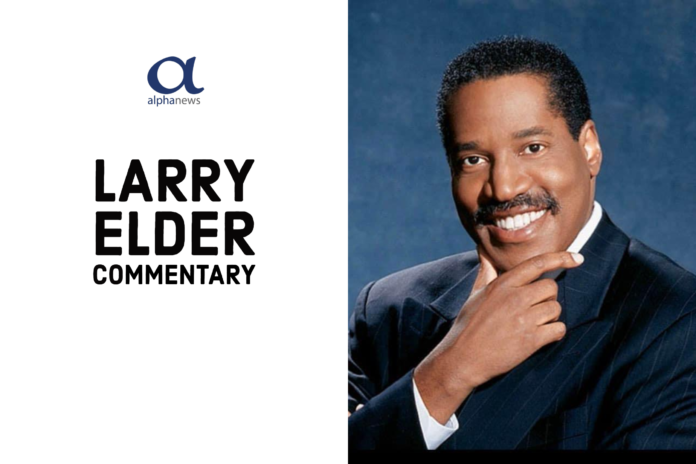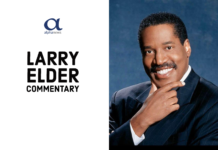In a recent television appearance, I discussed my appointment to a presidential commission called “The Social Status of Black Men and Black Boys.” I called fatherless households America’s top domestic problem, a particularly severe phenomenon in the Black community where nearly 70% of kids begin their lives in households with unmarried mothers.
I then received the following letter:
“Dear Mr. Elder:
“I saw your interview today … I wanted to share some information about this.
In the summer of 1969, I was a first-year obstetrics and gynecology resident at a hospital in New Orleans. I do not know if you are familiar with Charity Hospital. Unfortunately, it was closed by Hurricane Katrina. Up until then, it was nicknamed ‘Big Mother’ because most Black people in New Orleans were born there.
As a first-year obstetrical resident, I delivered 150 babies in three months. Only one of the mothers was married. Most of these girls were 11 years old. (Most people do not believe me when I tell them that and — unfortunately — I do not have written statistics to prove it.) Obviously, there was no way 11-year-olds could serve as parents to these babies. Grandparents tried to do the best they could, but they were often too busy working to provide for the extended family. These little girls quickly learned (and/or taught each other) that having babies brought checks from the Aid to Dependent Children Program in the state of Louisiana. They learned that if they needed more money, they simply had to bear another child. The problem with the ADC Program was that these young mothers were denied the check if the father of the child lived with them. This never made any sense to me. Still, that was the rule.
A public health physician at Tulane Medical School, Dr. Joseph Beasely, recognized the problem and tried to do something about it. He worked out an arrangement with the heads of OB-GYN Departments at Tulane and LSU Medical Schools to set up a free clinic. We residents manned the clinic. We did free examinations, free sexual counseling (many of these mothers did not know where these babies came from), prescribed birth control pills, inserted IUD’s, etc. The program proved to be a huge success. Unfortunately, a group of Black ministers shut us down after six weeks claiming we were committing ‘genocide.’
I do not know if you find this information useful, but I thought it addressed an aspect of what you were talking about. If you would like to discuss these matters in greater detail, please feel free to contact me.”
This problem is not confined to the Black community. In 2006, the Manhattan Institute published a piece in their quarterly magazine, City Journal, by Heather Mac Donald called “Hispanic Family Values? Runaway Illegitimacy is Creating a New U.S. Underclass.” She wrote: “Hispanic women have the highest unmarried birthrate in the country — over three times that of whites and Asians, and nearly one and a half times that of Black women, according to the Centers for Disease Control. Every 1,000 unmarried Hispanic women bore 92 children in 2003 (the latest year for which data exist), compared with 28 children for every 1,000 unmarried white women, 22 for every 1,000 unmarried Asian women, and 66 for every 1,000 unmarried Black women. Forty-five percent of all Hispanic births occur outside of marriage, compared with 24 percent of white births and 15 percent of Asian births. Only the percentage of Black out-of-wedlock births — 68 percent — exceeds the Hispanic rate. But the Black population is not going to triple over the next few decades.”
The problem, Mac Donald wrote, is worse among some subgroups: “The rate of childbirth for Mexican teenagers, who come from by far the largest and fastest-growing immigrant population, greatly outstrips every other group. The Mexican teen birthrate is 93 births per every 1,000 girls, compared with 27 births for every 1,000 white girls, 17 births for every 1,000 Asian girls, and 65 births for every 1,000 Black girls. To put these numbers into international perspective, Japan’s teen birthrate is 3.9, Italy’s is 6.9, and France’s is 10. Even though the outsize U.S. teen birthrate is dropping, it continues to inflict unnecessary costs on the country, to which Hispanics contribute disproportionately.”
In 1965, the percentage of Blacks born out of wedlock was 25%, a number considered so alarming that it prompted then-Assistant Secretary of Labor Daniel Patrick Moynihan to write his controversial report: “The Negro Family: The Case for National Action.” Today, the percentage of white children born out of wedlock is 28%.
If protesters are truly concerned about the condition of Black and Hispanic urban Americans in particular, why the pathetic silence over the fatherless households, the principal reason for the very conditions they complain about?
COPYRIGHT 2020 CREATORS.COM














